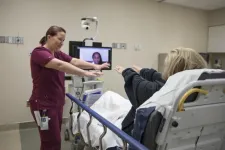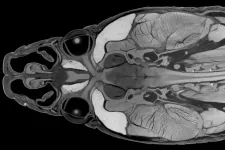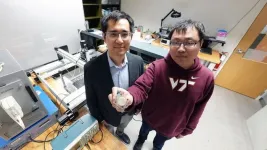(Press-News.org) Plans to devolve responsibility for the quality of England’s 11 national screening services could result in significant safety risks, experts tell The BMJ in an exclusive report today.
Assistant news editor Gareth Iacobucci explains that NHS England is currently discussing proposals to delegate some of the functions of the national Screening Quality Assurance Service (SQAS) from NHSE to regional Integrated Care Boards (ICBs).
But concerned experts warn that devolving responsibility to local organisations will spread resources more thinly, lead to a loss of expertise and independence, and compromise national oversight, making it harder to identify problems early and help improve screening pathways.
There are 11 national screening programmes in England. Three cover cancer screening (breast, cervical and bowel), six cover antenatal and newborn screening, and two cover abdominal aortic aneurysm and diabetic eye screening.
Screening programmes must report all safety incidents to the SQAS, and SQAS staff visit local sites to pick up urgent issues and make recommendations for improvements.
But talking to The BMJ under condition of anonymity, one individual involved in quality assurance visits warned that NHSE was cutting corners to save money.
They said cuts in recent years had already caused SQAS to drastically reduce the number of site inspections, meaning problems were not being picked up as early as they would have in the past. The BMJ understands that the SQAS headcount has reduced substantially since 2021 and the number of site visits across the country has fallen from around 140 a year to about 40.
They also said they had seen “some really quite scary stuff” on visits and that the latest plans would exacerbate this.
Sue Cohen, former national lead of screening quality assurance at Public Health England, told The BMJ that devolving responsibility for SQAS to local organisations would be a “retrograde” step.
Highlighting scandals such as in Kent in the 1990s, where a lack of oversight of a cervical screening programme led to women with cancer not being picked up, she said: “If you don't have a quality assurance service that is properly resourced and has that ability to keep a national view, you will simply not have the oversight of the system and there is a bigger risk of incidents going undetected.”
Devolving this complex role to ICBs would also risk “diluting” expertise and undermining what the service was set up to do, while cutting costs is a “very short sighted approach,” she added.
Cohen also said she was concerned that these proposals would make it harder to maintain the service’s independence. “If you don't have that separation, then you can have that conflict of interest of commissioners wanting to perhaps get a slightly cheaper service without understanding the quality consequences of doing that. It is really important that you separate out those functions, and we fought quite long and hard to maintain that.”
Muir Gray, former director of the UK National Screening Committee, said he was sceptical that devolving responsibilities for screening quality assurance to ICBs would lead to any positive impact in terms of driving improvement.
However, an NHS England spokesperson said: “NHS screening helps to save thousands of lives every year across England. Discussions about the possible delegation of some screening functions from NHS England to ICBs in the future are ongoing but no formal proposals have yet been put forward. We will continue to ensure that NHS screening services meet the highest standards.”
[Ends]
END
Safety fears for England’s screening services if national oversight is lost
Devolving responsibility to local organizations would be a “retrograde” step, says former screening quality assurance lead. NHS England “cutting corners to save money” warns site inspector
2024-05-23
ELSE PRESS RELEASES FROM THIS DATE:
Preteens use dating apps, and 1 in 4 are sexual minorities
2024-05-22
Though most online dating apps have a minimum age requirement of 18 years, a new study finds a small number of 11 to 12 year-olds use them. Lesbian, gay, and bisexual (LGB) preteens are 13 times more likely to report engaging in online dating compared to their heterosexual peers.
“Lesbian, gay, or bisexual adolescents, including preteens, may have limited romantic partner options in their schools, where they may also face discrimination, bullying, and stigma because of their sexual orientation,” says lead author Jason Nagata, MD, associate professor of pediatrics at ...
Merkin Prize in Biomedical Technology awarded to F. William Studier for development of widely used protein- and RNA-production platform
2024-05-22
F. William Studier of Brookhaven National Laboratory has won the second annual Richard N. Merkin Prize in Biomedical Technology for his development of an efficient, scalable method of producing RNA and proteins in the laboratory. His T7 expression technology can be used to make large quantities of nearly any RNA or protein and has been for decades, and continues to be, a mainstay of biomedical research and pharmaceutical production. The approach has been used to produce numerous therapeutics, diagnostics, and vaccines — including the COVID-19 mRNA vaccines credited with extending millions of lives in recent years.
“F. William ...
Geisinger funding renewed for familial hypercholesterolemia research
2024-05-22
DANVILLE, Pa. – Geisinger has been awarded $3 million from the National Heart, Lung and Blood Institute of the National Institutes of Health to continue its research on familial hypercholesterolemia (FH). The new funding will build on Geisinger’s ongoing work to improve communication with patients with FH and their family members and increase early screening and diagnosis.
FH is an inherited condition that causes high levels of low-density lipoprotein (LDL) cholesterol, often referred to as “bad cholesterol.” Left untreated, high ...
Solar physicists unlock the key to how sunspots form—and much more
2024-05-22
A team of solar scientists have uncovered the possible originals of the engine that drives much of the sun’s volatile nature—generating the sunspots that move like storm clouds over the surface and causing the sun’s activity levels to rise and fall over 11-year cycles.
The secret behind this engine, also known as the “solar dynamo,” may be among the oldest “unsolved problems of physics,” said Benjamin Brown, a solar physicist at CU Boulder.
In new research, he and his colleagues used mathematical equations ...
Stroke-care metrics improve with stroke center certification and coordinators
2024-05-22
Key stroke-care metrics improve at telestroke hospitals with stroke center certification and stroke coordinators.
That’s what NORC researchers at the University of Chicago found when they conducted an external evaluation of the telestroke program at the Medical University of South Carolina. NORC, which stands for National Opinion Research Center, and MUSC researchers report their findings in the Journal of Stroke & Cerebrovascular Diseases.
Mithuna Srinivasan, Ph.D., principal research scientist at NORC, is the lead author of the article and MUSC telestroke and telehealth experts Christine Holmstedt. D.O., Jillian Harvey, Ph.D., ...
Young people are increasingly using Wegovy and Ozempic
2024-05-22
Public interest in weight loss drugs like Wegovy and Ozempic is surging, but national data on dispensing patterns in the United States are surprisingly scarce.
Now, a national study from Michigan Medicine shows that the use of these weight loss drugs is increasing rapidly in adolescents and young adults 12-25 years, especially females.
Using 2020 - 2023 data from a national database representing 92% of pharmacies, the study team found a 594% increase in the monthly number of adolescents and young adults using Wegovy, Ozempic, and other glucagon-like peptide-1 receptor agonists ...
UArizona Health Sciences professor uses CT network to promote public access to open science
2024-05-22
Reading about the latest scientific discovery – such as the unearthing of a fossil representing a new species of tiny dinosaur – can be fascinating. But what if it were possible to do more than just read about it? What if you could go online, download a digital model and 3D print an exact replica of that fossil within minutes of reading the news? That is the goal of the Non-Clinical Tomography Users Research Network, or NoCTURN, an international group of researchers spearheaded by theUniversity of Arizona Health Sciences, the American ...
Designing autism-inclusive healthcare environments
2024-05-22
Autism is the most common neurodevelopmental disorder in the U.S., affecting an estimated one out of 36 children. Most people with autism experience unique sensory features such as differences in reactivity to touch, sounds, and sights or difficulty managing multiple sensory inputs at the same time.
These sensory differences can make the healthcare environment — often characterized by fluorescent lights, idle waiting rooms and uncomfortable pokes and prods — difficult to navigate, preventing children with autism from getting the care they need. To change that, occupational therapists Roseann ...
Zhenhua Tian receives National Science Foundation CAREER award to develop invisible acoustic tweezers
2024-05-22
Medical procedures capable of moving cells inside the body without making incisions have unique benefits. From faster recovery times to less trauma impacting the body, the list of reasons to do surgery without scalpels is growing with the technology used to perform noninvasive treatments.
A new method that might be available in the future is coming to life through research conducted by Zhenhua Tian’s team. The assistant professor in the Department of Mechanical Engineering is using tube-shaped acoustic energy to capture tiny biological ...
Community science volunteers can set scientific world abuzz with new bumble bee sightings
2024-05-22
TORONTO, May 22, 2024 – Community science volunteers – laypeople with an interest in bees and conservation – significantly contribute to the scientific knowledge of native bumble bees across Canada and the United States, finds a new study by York University.
It’s buzz worthy confirmation that community science programs can play an important role in monitoring the changing distributions of bumble bees and more. Community scientists have importantly also detected several at-risk or endangered species in unexpected locations, including the rusty-patched bumble bee and the gypsy cuckoo bumble bee. Trained scientists often haven’t seen some ...
LAST 30 PRESS RELEASES:
Increasing the number of coronary interventions in patients with acute myocardial infarction does not appear to reduce death rates
Tackling uplift resistance in tall infrastructures sustainably
Novel wireless origami-inspired smart cushioning device for safer logistics
Hidden genetic mismatch, which triples the risk of a life-threatening immune attack after cord blood transplantation
Physical function is a crucial predictor of survival after heart failure
Striking genomic architecture discovered in embryonic reproductive cells before they start developing into sperm and eggs
Screening improves early detection of colorectal cancer
New data on spontaneous coronary artery dissection (SCAD) – a common cause of heart attacks in younger women
How root growth is stimulated by nitrate: Researchers decipher signalling chain
Scientists reveal our best- and worst-case scenarios for a warming Antarctica
Cleaner fish show intelligence typical of mammals
AABNet and partners launch landmark guide on the conservation of African livestock genetic resources and sustainable breeding strategies
Produce hydrogen and oxygen simultaneously from a single atom! Achieve carbon neutrality with an 'All-in-one' single-atom water electrolysis catalyst
Sleep loss linked to higher atrial fibrillation risk in working-age adults
Visible light-driven deracemization of α-aryl ketones synergistically catalyzed by thiophenols and chiral phosphoric acid
Most AI bots lack basic safety disclosures, study finds
How competitive gaming on discord fosters social connections
CU Anschutz School of Medicine receives best ranking in NIH funding in 20 years
Mayo Clinic opens patient information office in Cayman Islands
Phonon lasers unlock ultrabroadband acoustic frequency combs
Babies with an increased likelihood of autism may struggle to settle into deep, restorative sleep, according to a new study from the University of East Anglia.
National Reactor Innovation Center opens Molten Salt Thermophysical Examination Capability at INL
International Progressive MS Alliance awards €6.9 million to three studies researching therapies to address common symptoms of progressive MS
Can your soil’s color predict its health?
Biochar nanomaterials could transform medicine, energy, and climate solutions
Turning waste into power: scientists convert discarded phone batteries and industrial lignin into high-performance sodium battery materials
PhD student maps mysterious upper atmosphere of Uranus for the first time
Idaho National Laboratory to accelerate nuclear energy deployment with NVIDIA AI through the Genesis Mission
Blood test could help guide treatment decisions in germ cell tumors
New ‘scimitar-crested’ Spinosaurus species discovered in the central Sahara
[Press-News.org] Safety fears for England’s screening services if national oversight is lostDevolving responsibility to local organizations would be a “retrograde” step, says former screening quality assurance lead. NHS England “cutting corners to save money” warns site inspector



